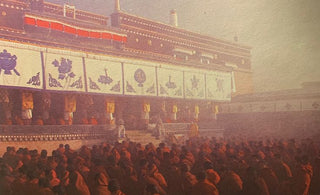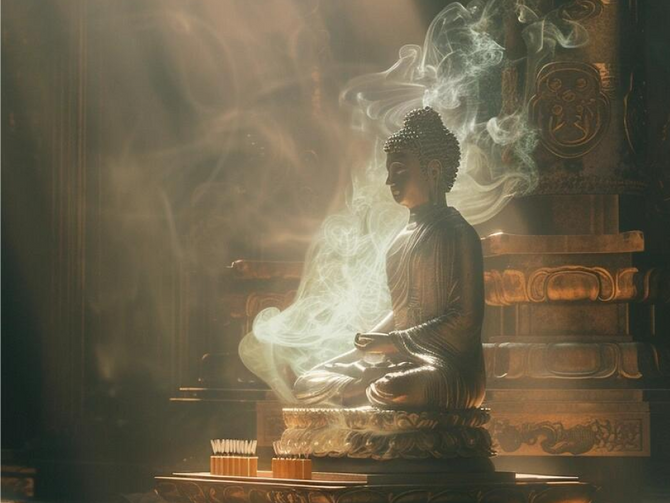
In the highlands of Amdo, where the sky stretches vast and unforgiving, spring does not arrive with blossoms—but with smoke. The ground is still frozen in April. The hills remain colorless, wind-bent. Yet amid this lingering stillness, columns of fragrant smoke begin to rise from the rooftops of homes, temples, and mountain ridges.
This is the time of sang-sol—the smoke offering ritual. As the new year settles and herders pray for the renewal of grasslands, these ancient rites prepare the land and the spirit for what is to come.
A Landscape of Elemental Belief
The Tibetan Plateau does not separate the natural from the sacred. Mountains are deities. Rivers are veins of life. Fire is a messenger. Smoke, in this worldview, is not just combustion—it is communication. When juniper branches, barley flour, and incense powders are cast into the flames, the ascending smoke becomes a vehicle for prayers, carrying them to the lha (gods of the sky) and the lu (spirits of the earth and water).
Offerings are made at dawn. The first light of the sun catches the smoke as it spirals upward. It is said that when the smoke rises straight into the sky without dispersing, the offering has been accepted.
When smoke rises straight,
The gods are listening.
When it curls and dances,
The spirits walk among us.
✨ In the flickering flames and fragrant ash, the invisible world is honored and renewed.
Spirits of Sky and Earth: Honoring the Unseen
The ritual of sang-sol is not just for the divine—it is also for harmony. On the Plateau, balance is everything. Too much wind can strip the soil. Too little water, and lambs will perish. The forces of nature are not random but relational. If a community has quarreled, if a sacred site was disturbed, if certain taboos were broken, imbalance may follow.
This is where the smoke speaks. The prayer words—chanted rhythmically in deep, resonant voices—ask for forgiveness, for protection, for rain, for peace. They name the mountain gods, the clan ancestors, the spirits of direction and dwelling.
Children are taught not to step over the smoke altar. Dogs, it’s said, should not bark during sang-sol. Elders remain silent, eyes half-closed. The ritual is both a cleansing and a negotiation: a gesture of reverence toward the unseen custodians of the land.
✨ The smoke is not burned for us.
It is burned for what we do not see, but live among.
Pastoral Timelines and Ancestral Memory
Traditionally, sang-sol was performed before major journeys, the first spring migration, or the release of livestock into the hills. Nomads would gather dried herbs and juniper, kept safe throughout the winter. On a designated morning, with elders leading, they would light a small fire outside the tent, and chant in unison as the blue smoke unfurled into the dawn.
The offerings were modest: barley flour, butter, dried cheese, a few coins. But the ritual was vital. It was said to ensure safe passage, the health of animals, and the goodwill of elemental spirits.
Blessing does not require abundance.
Only sincerity, direction, and breath.
✨ What is burned is less important than the heart behind the flame.
Continuity in the Present: Shared Breath and Memory
Today, the Plateau is changing. Roads thread the valleys. Cell towers rise where once only herds moved. And yet sang-sol continues.
In small towns and grazing settlements, young monks are taught the ancient prayers by elders who still recall the rituals of their own childhood. Families gather before sunrise. Elders lead chants. Sometimes, old cassette tapes of ritual melodies play through weathered speakers. Teenagers help light the fire, balancing modern jeans with traditional sashes. Children giggle as the smoke tickles their noses.
In some homes, a circle of stones marks the place where sang-sol has always been performed—untouched by time, wind, or change. Here, the flames dance with memory.
✨ In the continuity of smoke,
the culture remembers itself.
When Wind Becomes Prayer
Not all prayers need temples. Not all rituals need robes. Sometimes, all that is needed is wind, fire, and something to offer.
The spring smoke offerings of Amdo are not spectacles. They are quiet affirmations of relationship—between land and spirit, between ancestors and the present, between what can be seen and what cannot.
And in that smoke, rising silent and fragrant through the thinning sky, the past and future walk side by side.
The mountain does not ask for words.
Only for the smoke to rise with intention.
✨ And in the rising of that smoke, the year begins again.
































































